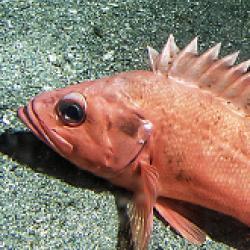Marine Ecology and Stock Assessment Program
The Marine Ecology and Stock Assessment Program has three primary functions. We 1) conduct annual stock assessments to manage the fisheries resources in Alaska waters, 2) conduct annual surveys to assess the status of these resources, and 3) perform ecological research process studies to inform stock assessments and advance ecosystem-based fisheries management.
Specifically, we produce annual stock assessment and fishery evaluation reports for sablefish, rockfish, and sharks in Alaska. We use a variety of fish population models to integrate fishery catch, survey data, biological observations, and theoretical considerations to recommend annual fish quotas. We conduct an annual longline survey and tagging studies to provide information for the stock assessments for Pacific cod, skates, Perch, Pacific halibut and other flatfish. Field and laboratory studies provide important information on different aspects of fish life history such as recruitment (i.e., when a fish is large enough to be caught by a commercial fishery), movement, growth, maturity, and natural mortality. We integrate this ecosystem process research into our stock assessments to support ecosystem-based fisheries management. Our program also conducts research on essential fish habitat, benthic habitats, and cold water corals and the effects of fishing on these sensitive ecosystem components. In our work, we often collaborate with other scientists, both within NOAA and with external partners, and with fisheries managers, stakeholders, and the general public. The Salmon Ocean Ecology and Bycatch Assessment Program provide an annual pink salmon forecast.
